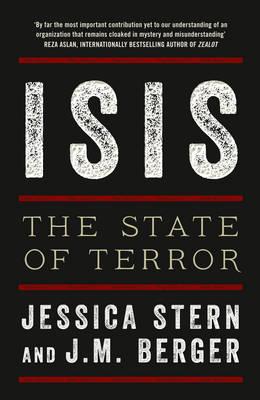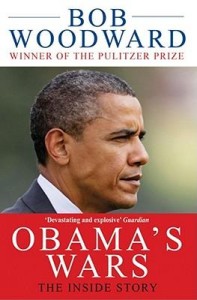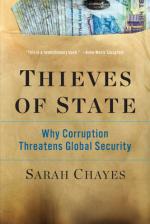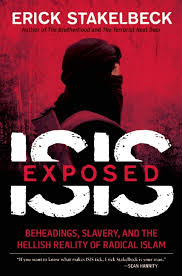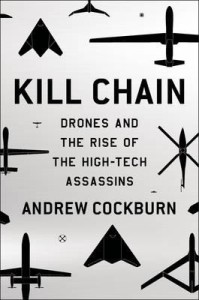Acclaimed as a major contribution to the world’s understanding of Islamic State, ISIS: The State of Terror by jihad experts Jessica Stern and J.M. Berger, delves into the disturbing spectacles of extreme violence in jihadist recruiting videos and the seductive appeal of jihad. As Islamic State have become within months the one most urgent conversation in the world, as the security situation deteriorates in country after country, in these most perilous times, in The Age of Terror, at the so-called End of Days, it is important to understand how this rapidly devolving situation originated; and to access the best intelligence available. In the world’s leading political news blog Politico, J.M. Berger, a consultant, researcher and analyst of jihadism within the US, writes, in a piece titled Barack Obama Still Misunderstands ISIL: The Obama administration’s misguided rhetoric on ISIL finally sped over the edge of a cliff over the last week. Officials stand now like Wile E. Coyote, still taking steps over thin air, bemused, in the moment before gravity takes hold. With the fall of Ramadi, and continuing through the fall of Palmyra, officials up to and including President Barack Obama have sought to recast the Islamic State’s victories as “tactical” setbacks. Variations on this line were trotted out by the Pentagon and other officials first, and reiterated by the President in an interview published Thursday, in response to a question about the loss of Ramadi: “No, I don’t think we’re losing. There’s no doubt there was a tactical setback, although Ramadi had been vulnerable for a very long time, primarily because these are not Iraqi security forces that we have trained or reinforced.”
Berger continues: For those who do not speak Wonkese, making reference to an enemy’s “tactical” success is code for saying that the enemy is not “strategic.”
To be strategic, according to the dictionary definition, is to identify long-term goals and take action to accomplish them. In the Washington vernacular, the act of Being Strategic implies a near mystical quality of superior thinking possessed by some, and clearly lacking amongst the vulgarians of the world—heedless brutes such as ISIL. Tactics are short-term ploys, easy to dismiss. Strategy is for winners.
Perversely, the United States is itself sorely lacking in strategy, whether in its pedestrian or mythical definitions, with regard to the problem of ISIL. We have deployed a fairly limited collection of tactics, with an increasingly baseless confidence that these will “buy time” for improbable political resolutions in Iraq and Syria. Buying time is inherently tactical, or in this case, magical.
In contrast to the Mideast hopes and dreams we have tossed in a box labeled “strategy,” ISIL does in fact have a strategy, which it is pursuing aggressively. ISIL’s long-term goal is a transnational caliphate, and its strategy to achieve that has been clearly laid out if you take the time to understand it:
(1) Establish a presence in territories rife with pre-existing political, ethnic, tribal and/or sectarian tensions, whether just simmering or openly bloody.
(2) Accentuate these divisions using calculated terrorist attacks, creating conflict among potential adversaries to erode their morale and effectiveness, and whenever possible, pit them against each other in an atmosphere of escalating violence.
(3) When military control of such territories can be established, extract their resources to fund and fuel additional expansion.
(4) Use a carefully calibrated messaging apparatus to project an image of strength and unity that exceeds the reality on the ground, while highlighting the political and military weaknesses of adversaries.
(5) Indoctrinate recruits using the language and techniques of an apocalyptic, millenarian cult. This may be a calculated strategy, or it may reflect ISIL leaders’ actual beliefs. Recruits may be local or global, and may be initially drawn to ISIL for pragmatic, political reasons, or they may be attracted primarily by its ideology. But once they are in the crucible, the ideology is liberally reinforced using every available means.
ISIL does also have tactics. While these are many, two are of particular interest, as they are sometimes unironically cited as evidence that ISIL is unstrategic. Its tactics include:
(1) Use extreme violence. ISIL’s extraordinary violence contributes to all of these goals in fairly quantifiable ways, such as polarizing the politics of its adversaries, intimidating military enemies and exciting fanaticism.
(2) Sow chaos. Creating a chaotic situation is not the same thing as losing control. Chaos can be strategic, if one is poised to capitalize on it, and it serves the strategic goals of inflaming division and instilling apocalyptic fervor in the rank and file.
One can certainly debate whether ISIL’s strategy is good or whether it is sustainable. For instance, ISIL could be seen as strip-mining its territorial holdings based on a very optimistic view that its short-term gain will produce additional resources for the long term, in the form of new conquests. The strategy contains flaws and is predicated on concealment of facts. It is highly opportunistic and may (or may not) be subject to cascading failures in the face of a truly major setback. But it is clearly and obviously a strategy.
Over the last several years, many in Washington have unfavorably compared al Qaeda in Iraq—and more recently ISIL—to al Qaeda Central on the basis of the latter’s allegedly superior strategic focus. This assumption that may have contributed to President Obama’s unfortunate characterization of ISIL as the “jayvee team” of terrorism one year ago.
There is no question al Qaeda and its supporters like to talk about strategy in more depth and at far greater length than ISIL is known to do, at least in formal treatises and based on what is available in open sources. The most notable of these, perhaps, is the 1,600-page “Call to Global Islamic Resistance” by Abu Musab al Suri (which influenced ISIL at least as much as al Qaeda). Osama bin Laden himself spent his waning years penning , some of which were this week.
When viewed over time, al Qaeda begins to look like a terrorist think tank, with dozens of fellows penning policy papers containing ranges of options. It’s probably safe to say al Qaeda is more analytically inclined than ISIL, but those analyses less frequently translate into action. In contrast, ISIL is all about action, but that doesn’t mean it proceeds without a plan.
Ironically, our failure to appreciate ISIL as a strategic entity makes its strategy more effective. When we downplay and underestimate ISIL, we make its victories more dramatic and stirring to its legions of recruits—and more demoralizing to its enemies. We imbue its successes with the very mythic qualities ISIL itself seeks to engender in its highly stylized propaganda, casting the jihadists as David against a world full of Goliaths. In reality, its enemies are a coalition of conflicted and
half-hearted allies who are united only by their opposition to ISIL, while remaining adversaries to each other—the exact kind of enemy that ISIL seeks.
Since September 11th, our collective tendency has been to overestimate the power of jihadist groups. With the rise of ISIL, it is natural and even healthy to seek a corrective.
But the best of all solutions is to view our adversaries with clear eyes and clear heads. And the first step in the right direction is to recognize that ISIL’s success so far is not just a string of unconnected tactical triumphs. The administration may find it rhetorically attractive to deny ISIL credit for its victories, but it seems we believe it ourselves. Listening to a long list of officials speak about ISIL over the course of the last year, it is difficult to conclude that the United States has been anything but blindsided by events.
ISIL’s approach may be fraught with risk. It may be doomed to fail. It is without a doubt morally abhorrent. But ISIL has a strategy. We should ask ourselves if we can say the same.
ISIS: The State of Terror draws on the author’s unusual access to intelligence sources and material, law enforcement, and groundbreaking research into open source intelligence, Jessica Stern, a Lecturer on Terrorism at Harvard University and author of Denial: A Memoir of Terror and Terror in the Name of God, along with J.M. Berger, author of Jihad Joe: Americans Who Go To War in the Name of Islam, examine the startling effectiveness of the Islamic State’s use of social media as a means of luring and recruiting citizens from countries such as the United States, Great Britain, and France—using recent examples such as Douglas McCain, the American citizen from Minnesota who joined ISIS and died in combat fighting on the side of the Islamic State.
Foreign policy journalist James Traub describes ISIS: The State of Terror as one of the best books yet on Islamic State: “Islamic State is scaring the daylights out of us. Al-Qa’ida announced itself to the world with an unspeakable bang but across time retreated (and regrouped) in the face of drone attacks and heightened surveillance and law-enforcement efforts. Islamic State seems only to proliferate, like a lethal virus that has escaped from the lab and begun madly self-replicating.
“Already established across a chunk of Iraq and Syria equal in size to Britain, it has begun to colonise Libya and perhaps the Sinai, Afghanistan and Yemen. Kurdish soldiers and American pilots are killing hundreds or thousands of Islamic State warriors, but still more stream across the Turkish border to die a glorious death. Islamic State seems to be nourished from a demonic wellspring.
“It has advanced to the centre of our lives, and our nightmares, with astonishing speed . . . Islamic State was a much better organised, more adaptive and more media-savvy organisation than almost anyone — very much including US intelligence — understood. The US President had his metaphor backward. On the strength of three recent books about this new generation of extremists, I would say al-Qa’ida is IBM and Islamic State is Apple.
“Islamic State’s snuff films have proved to be an effective marketing tool, especially with foreign audiences. Important Islamic State messages are simultaneously released in English, French and German, then translated further. Beheading British and US prisoners enacts a deeply satisfying drama of vengeance and power reversal to those who feel crushed by, and in, the West.
“But Islamic State would not be nearly so powerful an organisation if it appealed only to bloodlust. Unlike al-Qa’ida, which offers the possibility of victory only in some remote era, Islamic State, by occupying territory and declaring the caliphate, invites its followers to live in the prophesied paradise. It offers destruction right now, redemption right now.”
